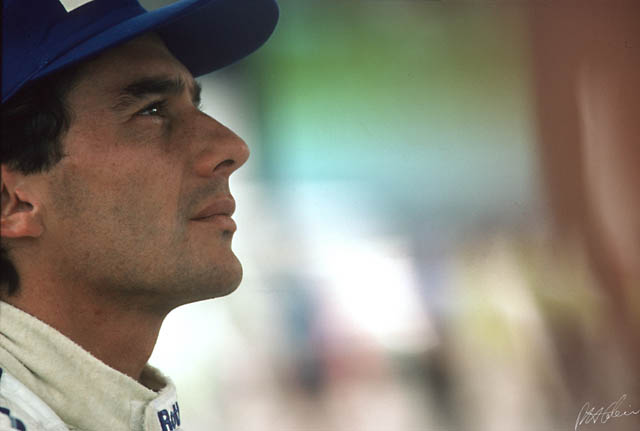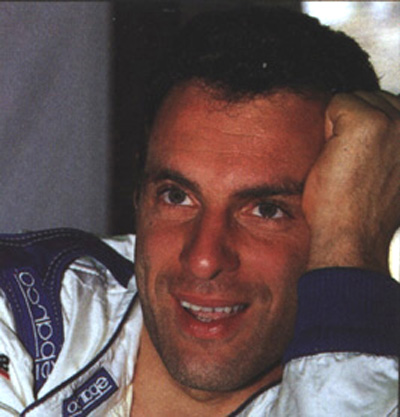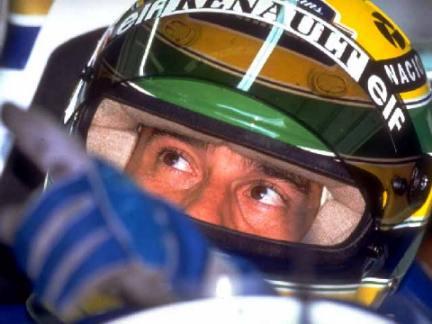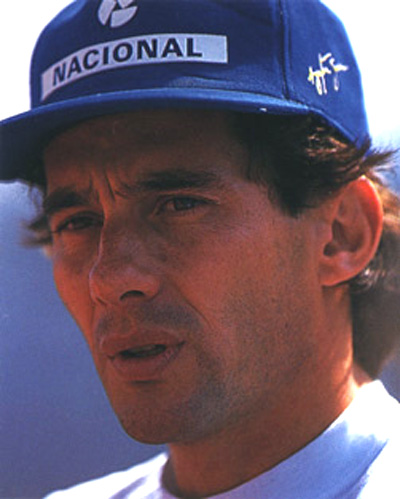
MADE IN HEAVEN
|
Iím
taking my ride with destiny Willing
to play my part Living
with painful memories Loving
with all my heart Iím
having to learn to pay the price Theyíre
turning me upside down Waiting
for possibilities Donít
see too many around Iím
playing my role in history Looking
to find my goal Taking
in all this misery But
giving it all my soul Made
in heaven, made in heaven It
was all meant to be Made
in heaven, made in heaven Thatís
what everybody says, wait and see It
was really meant to see So
plain to see Everybody,
everybody, everybody tells me so Yes,
it was plain to see Yes
it was meant to be Written
in the stars... Written in the stars...
|
Lyrics
by: Freddie Mercury
1994.
In
1984 young Ayrton Senna tried to catch up with his rivals with might and main in
an uncompetitive car. The situation at the beginning of 1994 was compared to
1984 by the journalists. But was it a justified comparison?
Also
in 1994 young enthusiasts were trying to catch up with their rival (because this
time there was only one), but they werenít driving uncompetitive cars but
"very competitive" ones so you get an impression that everything
turned, in some bizarre way, to "hunting a person". ďWhen will they
catch Senna?Ē, it was evidently the most important question which peeped out
from every line of the newspaper articles, not who and how will and in which
race beat Senna and get the title, but when will Senna be beaten. And for Ayrton
began something his nerves werenít able to endure - incertitude. Because
instead of the "car from a different planet" he got a very capricious
vehicle that he couldnít completely trust, not in a single moment. "A
car from a different planet is a desire I never wish to have again" -
he confessed worried by incertitude which brought slight, but increasingly
noticeable anxiety. One cycle in his life was coming to its end and he had to
feel it. He sensed that a change was about to happen, but he didnít know what
kind of a change. That wasnít in his hands anymore.
Senna didnít finish the first two races. Nothing to worry about when he was in question. And it wouldnít have been if there hadnít been Imolaís turn, because he didnít lose anything of his brilliance as a racing driver, three pole positions in three qualifying sessions are the best proof for it. Even in Imola, despite of the great pain in his soul, he forced himself to separate the professional part of his life and managed to master it perfectly - he started from the first position. He tightened his heart for who knows which time and he died with his heart tightened like that.

Ayrton at Pacific Grand Prix, Aida 1994
You
surely noticed that no statistics have been mentioned in this story about Ayrton.
Maybe now itís a good moment to do so because thereís one piece of
information which is impossible not to mention. It is the statistic data which
tell us the number of won pole-positions in the history of F-1. The first
starting position can be won only in one way - out on the track. The car (which
has to be perfect as a result of the maximum effort of the mechanics) and the
man decide about the score. It involves no sort of politics, which was so
cruelly embittering Ayrtonís life to the last moment.
| NUMBER OF RACES | NUMBER OF POLE POSITIONS | |
| AYRTON
SE |
161 | 65 |
| JIM CLARK | 72 |
33 |
| ALAIN PROST |
199 |
33 |
| NIGEL MANSELL |
185 |
32 |
| JUAN-MANUEL FANGIO | 51 | 28 |
| NIKI LAUDA | 171 | 24 |
| NELSON PIQUET | 204 | 24 |
Almost
all drivers, whose names are underneath Ayrtonís are many-time champions, that
is, they are all legends of F-1 sport.[1]
But
letís get back to Imola 1994, to that sad and terrible weekend, when many
things emerged to the surface in all their brutality and cruelty. The drivers
had been talking for some time that there was too little concern about their
safety. Ayrton was just warning but he didnít take any concrete steps. They
were persuading him to initiate a driverís union, but he was skeptical - he
knew too well the character of the authorities and how fights with the system
usually end.
"I am
the only world champion left - and I have opened my big mouth too often. Over
the years I have learnt that itís better to keep my head down...",
that was how he, a bit resignedly, explained his vacillation, and in Ď93 he
described the condition in F-1 like this:
"The
downside of F-1 is the political side and the decisions on the political side
are not always correct or fair, but you have to accept them if you want to be in
F-1 because you have no choice. Itís a general thing in sport, not just
formula 1."
At
the same time he was warning that the new rules for the Ď94 season arenít
the best solution. "It is a big
mistake to abolish all the electronics so suddenly. Cars will be as fast as
before but harder to drive. The 1994 season is going to be a season with a lot
of accidents. I will even risk saying that if something really serious doesnít
happen, we will be happy", he said this aware of the fact that cars
have to some degree become weapons.
"The racing car can also be a weapon", his words from 1992 (although
people didnít understand them differently except as a threat to Prost). And
Ayrton became aware even then that the newest and super-fast cars require
careful handling and that those machines donít tolerate a single levity any
more. And by abolishing electronics and active suspension, which was one of the
most important elements of active safety of the car, they literally became
deadly weapons. (Electronics was abolished because "safe races" became
uninteresting for the spectators and something to attract them again needed to
be done. The price for that decision was paid in Imola.). Ayrton knew the size
of the danger that was threatening the drivers if the full potential of those
cars was used in the fervency of the battle, and that was the reason he was
persistently talking that the aggressiveness of the young drivers must be
controlled. After 10 years in F-1 he knew what he was talking about, but people
thought he only wants a clean situation for himself, for the God-Senna.
Three
days before his death he gave an interview for the Croatian television and he
talked about it so patiently as if he was talking to little children. He was
aware of the fact that people most probably wonít understand him, although the
1994 season began exactly as he feared: with accidents. Only his death slowed
down this trend because it literally forced officials to act.
Rubens
Barrichello was the only one who was to be really lucky during that ill-fated
weekend, because he got away almost uninjured (in terms of F-1). It was the last
happy moment that weekend, and after it only the naked, bloody, extreme reality
of F-1 world followed, which is concealed behind all sorts of make-up just to
keep it out of sight, but which is still one of the main allurements of this
sport. It is exactly this that attracts many people to it - this possibility of
being a witness of something terrible, to be shocked by that scene, and, at the
same time, to feel the joy that you can simply continue to live. It is
unwillingly recognized, but it is true.
And
on Saturday deceased Roland was taken from the track. He was a newcomer in F-1
and his death was an inconvenience for the organizers but otherwise a matter of
statistics: he was 35. driver who died in F-1 sport. The things would stay like
this in this gladiator arena, if there wasnít for someone who was truly hurt
by this direct look at the other side of motor racing. Ayrton was appalled but
he didnít close his eyes and pretend that was the way it was absolutely
supposed to be. He knew that it wasnít, and he wanted to find out, investigate
and figure out why did it still happen. That immediately disturbed the
authorities who knew they couldnít run away from him this time because if he
had stayed alive, he would have used every available means and all his strength
to put some things in F-1 in order. No pressures and intimidation from the
bosses would have stopped him, not after Rolandís death. And because they knew
him they rushed to strike first. Senna received a written warning from the
Stewarts of the Meeting which said there was no reason for him to go to the
scene of Roland Ratzenbergerís accident and that they demanded an explanation
about what he had intended by visiting the place of the accident. Can you
imagine that? That he should explain what was his intention...

Roland Ratzenberger
This
demand came from people who wonít show their noses outside their safe offices
and to whom the biggest threat is that the sky might fall on their heads if
shares lost in value, they warn a person who will have to sit in an insecure
(and therefore life dangerous) car in a few hours and who was now more than ever
before aware of the fact that things for him or for any other driver could end
up like in Rolandís case. Ayrton realized completely that that last thing
which he always tried to preserve was taken from him here. This was how he
explained this "last thing":
"I
always try, even when itís not so noticeable, to create myself a small
possibility of avoidance when I drive, slight reaction on the seat, a kind of a
personal security range, like a shelter, to try to avoid some harder injury."

This
small possibility was taken away from him here, in and out of the car, because
for him, there wasnít a way of avoiding the start that Sunday: his personality
was in such position in the world in that moment that a withdrawal would have
meant a negation of everything that he had been fighting for so dedicatedly for
all his life. Courage, determination, strength - he had to persist for those
values here too, because if he hadnít raced because he was scared for his own
life, it would have been a capitulation in the eyes of the millions. Who knows,
maybe Ayrton would have allowed himself to mourn in peace the death of a
colleague that Sunday instead of racing, if he hadnít been so fanatically
admired. But he couldnít have done it in his situation although he knew that
he would most probably be at the very limit during the race. He would have to
drive with all the aggressiveness and potential, like in the early days, in an
unsafe car. He knew all of this, but he still set out on his last journey, he
didnít desist. He wouldnít have given up even if he had known he was going
to die, because his work wouldnít have been completed without his last journey
because "what ever will be will be, heíll just keep on trying, till the
end of time."
It
looks terribly ironically but it is a reality that millions of admirers in their
hearts accepted his death easier than they would have accepted that Ayrton had
been unfaithful to Ayrton Sennaís ideals. And so we are back at the beginning:
the fact that many of the chosen get killed on their own path doesnít mean
anything to them. They have to stay faithful to their inner voice.
A
few years later another brutal death happened, a death of a person who was
adored by millions because of her struggle against the authorities and for
ideals and who couldnít, despite the royal status, renounce the simpleness,
which was her way. Paparazzi, who had to have the latest pictures of their
favorite "state princess" at any price, chased Diana, princess of

People
in
Brazil
who followed Ayrton to the place of his final rest were showing something else -
gratitude. People who have so little in the real live knew how to show gratitude
for everything that Ayrton had defended, for himself and for them, until his
death. And in the fact that as the only one among his colleagues in F-1 Michael
Schumacher didnít attend his funeral we can sense a certain guilt. For on the
eve of the Ď94 season there have been some rumores about Benetton team (in
which Michael Schumacher raced) using illegal means. Ayrton was asked if he was
perhaps worried about having to fight with unfair competitors. "I
really canít say much about it. Itís difficult to talk about things one
cannot prove", he carefully answered then. (The day when they proved
this to Benetton Ayrton didnít live to see.) That is why Michaelís absence
at Ayrtonís funeral talks for itself. Transparent excuses that he was afraid
for his life look ridiculous, because we know that Michael Schumacher isnít a
coward. This behavior will always remain a black spot on his otherwise dazzling
career because he became the direct and (if we look only at driving skills)
worthy successor to Senna. It is really a shame that he didnít say goodbye to
this great man with the respect he deserves...
And
that day, when millions said farewell to Ayrton, Michael really didnít have
nothing to be worried about. It was written in the newspapers that during
Sennaís funeral not a single murder, theft or riot occurred in Sao Paulo.
The sorrow defeated violence if only for one day. This sorrow was global and it
went around the planet because the greater the person is, the greater is the
pain felt for him/her.
1 1997
statistics.